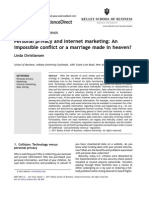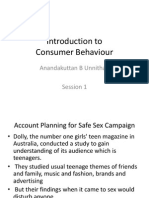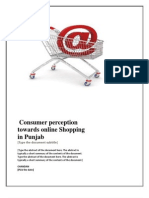Marketing to Children
• Quiz on Monday
• Make-up class Tuesday 6:30 pm
�Marketing to Children
• Children 12 and under spend more than $11 billion of their own
money and influence family spending decisions worth another $165
billion on other items (like food).
�The power of kids & teens
• Breakfast choices (97% of the time) and lunch choices (95% of
the time).
• Where to go for casual family meals (98% of the time) (with 34% of
kids always having a say on the choice of casual restaurant).
• Clothing purchases (95% of the time).
• Software purchases (76% of the time) and computer purchases (60%
of the time).
• Family entertainment choices (98% of the time) and family trips and
excursions (94% of the time).
��the June 1918 issue of the Infant's Department, a trade
magazine for baby clothes manufacturers, said: "There
has been a great diversity of opinion on this subject, but
the generally accepted rule is pink for the boy and blue
for the girl. The reason is that pink being a more
decided and stronger color, is more suitable for the boy;
while blue, which is more delicate and dainty is prettier
for the girl."
���• Put yourself in the shoes of the company.
• Put yourself in the shoes of the parent.
• Put yourself in the shoes of the society.
• Can we agree that different options should be available for all groups?
�Advertising to Children
• Should advertisers be able to advertise junk food to children?
• What about candies?
• What about in schools?
�Advertising to Children
• There are questions concerning the ability of children to understand
the intent behind advertisements.
• Children don’t understand persuasive intent until they are older.
Cognitive structures are still being formed in the brain, making
children more susceptible to external influences.
• Children don’t realize that athletes in television commercials are paid
to promote products.
• They also believe that children in advertisements are real rather than
paid actors, and they confuse advertisements with news items.
�Advertising to Children
• WHO has stated the importance of discouraging marketing practices
that promote unhealthy dietary practices, urging national
governments to develop multi-sectorial approaches to achieve this.
• Policies to reduce the impact of food and non-alcoholic beverages
high in saturated fats, trans fatty acids, free sugars, or salt, is one of
the 25 indicators in the WHO Global NCD Action Plan 2013-2020.
�Consumer Privacy
�Right to Privacy and Business Ethics
• The right of persons to determine what, to who, and how much
information about themselves will be disclosed to other parties.
• Psychological privacy
• A person’s inner life. Includes the person’s thoughts and plans,
personal beliefs and values, feelings, and wants.
• Physical privacy
• With respect to person’s physical activities.
�Consumer Privacy
• Why is privacy a right? Why is it so important?
• What is the Urdu translation of privacy?
• Do you think social media allows you to control your privacy?
• Do you use it anyway?
• What is your opinion about big data?
• What is your opinion about surveillance at the workplace? What if
your employer says she wants a camera in your office to make sure
you spend your time working?
� Importance of Consumer Privacy
• Privacy ensures that others do not acquire information about us that, if
revealed, would expose us to shame, ridicule, embarrassment, blackmail,
or other harm.
• Privacy prevents others from interfering in our plans simply because they
do not hold the same values we hold.
• Example: Activities that do not harm anyone but are seen as distasteful by
others.
• In other words, privacy allows us the freedom to behave in
unconventional ways.
� Importance of Consumer Privacy
• Privacy protects those whom we love from being injured by having their
beliefs about us shaken.
• Would you want your mind read by those who are near and dear to you?
• There might be things about ourselves that, if revealed, might hurt those
whom we love.
• Ultimately, privacy allows individuals the freedom to share with others
aspects of their life that they want on their time and on their conditions.
� Importance of Consumer Privacy
• Enables the intimacy that develops personal relationships,
• The trust and confidentiality that underlies client-professional
relationships, (doctor, lawyer)
• The ability to maintain distinct social roles (supporting an unpopular
cause in a firm privately), and
• The ability to determine how others will see us.
• Who has right to information once it is posted online?
• Do you want the right to be forgotten?
�Balancing Right to Privacy and Business Needs
• Is the purpose of collecting information a legitimate business need
that benefits the consumer?
• Is the information that is collected relevant to the business need?
• Is the consumer informed the information is being collected and the
purpose?
• Did the consumer consent to the information disclosure?
• Is the information accurate?
• Is the information secure and not disclosed to recipients or used in
ways to which the consumer did not consent?



























































































